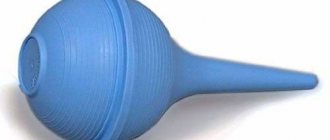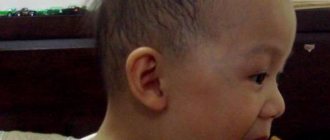What is constipation?
Functional constipation is one of the most common problems in pediatrics. They most often occur at the age of 2-4 years, when the child is potty trained. However, both at an earlier and at an older age, bowel dysfunction worries approximately 15-25% of children.
In order to understand whether it is constipation or not, special diagnostic criteria have been developed. To make a diagnosis, there must be at least 2 symptoms observed within 1 month:
- 2 or fewer bowel movements per week;
- episodes of excessive accumulation of feces in the intestines;
- episodes of painful or difficult bowel movements;
- episodes of large diameter stool;
- the presence of large fecal masses in the intestine of a child trained in toilet skills.
Additionally, the following symptoms may be observed:
- at least 1 episode per week of fecal incontinence in a toilet-trained child;
- episodes of large-diameter stool, which can cause blockage in the toilet drain.
Diagnostic criteria for diseases and conditions associated with constipation of functional origin, in accordance with the Rome IV criteria (2016)
That is, you need to understand that constipation is not only retention of stool, but also difficult, painful passage of feces with incomplete bowel movements (when the child holds back bowel movements) (even if he goes to the toilet every day).
Causes of constipation
There are many reasons why a child may experience constipation. The most common is unbalanced nutrition. The predominance of quickly digestible carbohydrates, low amount of fiber in the diet, insufficient fluid intake during the day - all this leads to disruption of intestinal function and weakening of perilstatics.
In addition, in recent years there has been a lot of talk about the influence of stressful events on the formation of constipation in a child. Among the trigger factors are: untimely and painful potty training, bullying from peers and other family members, hospitalization, separation from loved ones, frequent punishments and others.
When a child experiences frequent constipation, we can often observe a kind of vicious circle: having once experienced pain during bowel movements, the child begins to subconsciously restrain and suppress the urge to defecate, which leads to the accumulation of feces in the rectum. And having accumulated in large quantities, dense feces cannot come out painlessly! That is why treatment of constipation should be carried out comprehensively.
How to treat constipation in children?
Constipation should only be treated if it bothers the child. There is no need to treat the child because the mother is worried, the doctor “doesn’t like” the stool analysis or opportunistic microflora was found in it, or because the color of the stool and the frequency of bowel movements do not meet your expectations.
In case of stool retention, treatment is aimed at:
- nutrition correction;
- improvement of intestinal motility;
- normalization of intestinal microflora.
Treatment of constipation consists of the following sequential stages:
- assessing the cause of constipation;
- nutrition correction (replacing formula or prescribing a nursing mother or child a diet that includes more fiber and water);
- normalization of the child’s physical activity and the formation of hygienic habits during bowel movements;
- correction of intestinal microflora;
- prescription of medications.
All children with constipation are advised to exercise a lot, jogging, swimming or other sports.
Children older than one year with constipation if helminths are suspected require appropriate treatment.
Approaches to the treatment of constipation during breastfeeding, formula feeding and after the introduction of complementary foods differ significantly.
Diagnosis of constipation in children
Today, in accordance with international recommendations, in order to verify constipation in a small child, the doctor only needs to correctly collect anamnesis, i.e. interview parents about the duration of complaints, features of defecation, compare with the clinical picture and take into account diagnostic criteria. All! There is no need to test coprogram and feces for dysbacteriosis! If necessary, the attending physician may prescribe additional instrumental diagnostic methods (ultrasound of the abdominal organs, X-ray contrast studies, etc.).
Symptoms of anxiety
If you suspect constipation in a young child, pay attention to the so-called “red flags”, i.e. symptoms, the presence of which indicates the need to consult a doctor!
- early onset of constipation (less than 1 month of life);
- passage of meconium after more than 48 hours in a full-term newborn;
- family history of Hirschsprung's disease;
- ribbon stool;
- blood in the stool in the absence of anal fissures;
- fever combined with stool retention;
- vomiting bile;
- severe bloating.
When should constipation in children be treated?
- Weight lags behind height or is ahead of it by more than two corridors of the percentile scale (the level of development of an infant is determined using special tables).
- Stool retention is accompanied by: abdominal pain,
- bloating,
- crying and worrying.
The danger of bowel retention is that hard feces can injure the anus or cause fear of defecation (due to painful sensations).
What to do if your child is constipated?
When a child goes to the toilet quite rarely (no more than 2-3 times a week, but without blood in the stool and severe pain), and the stool is dense (type 1-3 according to the Bristol scale), then, first of all, you need to pay attention on his diet and level of physical activity. Add more fresh vegetables and fruits, cereals, dairy products to your diet, and analyze the amount of water you drink. It is important to ensure sufficient motor activity - this additionally stimulates perilstatics.
If the family first encountered a problem when the child did not walk “largely” for more than three days or bowel movements are not effective (i.e. the baby is in the toilet for more than half an hour, cries in pain and says that “I can’t poop”), then As an emergency, you can use an enema or rectal suppositories. It is worth clarifying that the currently popular microenemas have an exclusively local effect, i.e. if a small amount of feces has accumulated in the ampulla of the rectum, and constipation is no more than three days. If the problem is more “global”, it is necessary to resort to cleansing. There is nothing scary about this.
Take a syringe with a volume of 300–400 ml. Depending on the age, the volume of fluid administered will be different - this must be clarified with the pediatrician observing the baby, but approximately the volume is calculated using the formula: 1 kg of body weight = 20 ml of fluid. The liquid should be warm - approximately body temperature, i.e. 37 °C or slightly lower. Lubricate the tip with Vaseline or baby cream. The child needs to be laid on his left side and his legs pressed to his tummy (pre-calm him if he is scared). The tip is inserted into the anus with a gentle twisting motion towards the navel about 4–5 cm. Pour in the liquid slowly, carefully, while squeezing the baby’s buttocks.
Most likely, the child will say that it is difficult for him to hold back his feces and that he is about to “shit himself.” This is how it should be, warn him about this in advance. Pull the tip out of the anus and continue squeezing the buttocks with your hand. Do not let him sit on the potty or toilet for about 5 minutes - during this time the stool softens. Talk to your child at this time, distract him, you can turn on a cartoon. I repeat that these are extreme measures. You should not often resort to such intestinal cleansing, since it is almost always scary for the child. After enemas, children often begin to be afraid of even antipyretic suppositories! If your baby has frequent constipation, be sure to consult a doctor!
Recurrent constipation in a child is treated comprehensively. Treatment includes long-term use of laxatives followed by maintenance prophylactic doses, as well as behavioral therapy aimed at eliminating fear of bowel movements and establishing a bowel movement routine.
What to do if your baby is constipated?
Before 6 months of life, true constipation is rare. The main food for a child of this age is breast milk or adapted milk formula, which have a liquid consistency. In children of the first year of life, constipation most often occurs when complementary foods are introduced into the diet. This is not something to be afraid of, since changes in stool consistency due to the appearance of new foods in a child’s life are quite logical.
However, there are a number of conditions that can cause constipation and deserve special attention.
- Intestinal obstruction or intussusception: the child experiences paroxysmal restlessness, severe crying, and refusal to eat. The body temperature is normal, the abdomen is soft. After 5-6 hours, stool retention and bloody discharge from the rectum appear. This condition requires emergency care in a pediatric surgical hospital!
- Hirschsprung's disease: a disease in which the innervation of the colon is impaired. Constipation has been observed since birth.
- Congenital hypothyroidism: the movement of stool through the intestines slows down.
- Pathology of the central nervous system: often in diseases of the central system, which are associated with changes in muscle tone, a weakening of perilstatics is observed.
- Spina Bifida: a malformation of the spinal cord in which constipation is quite common.
So, if constipation in a child is still associated with changes in the usual diet, what should be done:
- Perform a tummy massage for the baby - use careful, soft finger movements to press on the anterior abdominal wall, paying attention to the baby’s reaction;
- you can take a warm bath - this will help relieve spasm from the intestinal muscles;
- postpone the introduction of a new product until the stool normalizes;
- in case of stool retention for more than three days - a cleansing enema/microenema or laxative suppositories (from three months);
- If constipation occurs regularly, contact your pediatrician!
Of course, such a delicate problem raises many questions, and when a small child has constipation, it also gives rise to a lot of fears. However, timely consultation with a doctor and proper treatment will help solve this non-children’s problem.
Causes of constipation in children
The causes of constipation are varied. We, pediatricians, believe that constipation is primarily associated with poor nutrition
or the so-called nutritional factor.
The cause of chronic constipation is a deficiency in the diet of coarse plant fiber
as one of the main stimulants of intestinal motility (vegetables, fruits, coarse breads, gray varieties of cereals, etc.), as well as
consumption of high-calorie, refined foods
. As a result of such nutrition, a small amount of dehydrated fecal matter is formed in the colon, and their movement through the intestines is disrupted. It has been noted that a lack of water in the stool leads to a significant delay in the movement of stool through the intestines. This is especially clearly manifested in the winter-spring season, when the consumption of both fresh and prepared vegetables and fruits is noticeably reduced.
The second important point in the formation of functional constipation is a sedentary lifestyle.
, eliminating full loads on the muscles of the anterior abdominal wall, and the latter play an important role in potentiating intestinal movements.
Predisposing factors to the occurrence of chronic constipation in children are also congenital anomalies of the colon
, such as dolichosigma (elongation of the sigmoid colon) and dolichocolon (elongation of the entire intestine). Constipation can be caused by intestinal parasites (roundworms, whipworms, bovine or pork tapeworm). Protozoan microorganisms (Giardia) rarely cause stool retention in childhood.
The state of the child’s nervous system plays an important role in regulating the motor function of the colon.
. Various stressful situations, mental, emotional and physical overload, unfavorable family and school relationships between children and adults negatively affect the general condition of the child’s nervous system, which in turn leads to disorders of the motor function of the colon. Elimination of stressful situations, normalization of the psychological situation in the family and at school, and in some cases, the help of a neuropsychiatrist, have a beneficial effect on the treatment of the disease.
Prolonged retention of a child's feces leads to the absorption of rotting and fermentation products from the intestines into the blood, which has a negative effect on the child's entire body (toxic effect). Children complain of headaches, increased fatigue, their appetite decreases, and sleep is disturbed. Children become irritable, whiny and sometimes “uncontrollable.” If there is no stool for several days, he may experience severe abdominal pain, vomiting, and increased body temperature.
Very often, dense feces, accumulating for a long time in the final section of the colon, stretch the anus when trying to empty. This may cause cracks to form
. Cracks are always accompanied by acute pain in the anus during and after bowel movement. The child is afraid of these painful sensations and tries to avoid attempts to empty the intestines, which leads to even greater compaction of the stool.
In advanced cases, with a prolonged absence of stool, as a result of increasing intraintestinal pressure, such an unpleasant condition as stool may appear, that is, spontaneous leakage of feces through the anus. The consequences of this condition are clear. The child becomes the object of jokes, and in some cases, more aggressive actions from peers. The patient’s mental state is on the verge of collapse, children refuse to go to kindergarten or school, and the feeling of fear exceeds all reasonable limits.
Chronic constipation in a child can also appear when the child loses the habit of bowel movements at the same time (usually in the morning). Parents are often to blame here because they pay little attention to their child’s life and do not teach them from early childhood to defecate at a certain time.
We have noticed that some teachers in kindergarten or school, for strange, sometimes indescribable reasons, do not allow young children to go to the toilet during class. Such illiterate behavior of the teacher leads to the fact that children deliberately suppress the urge to defecate during school. This harmful reflex easily becomes established and causes chronic constipation.
This phenomenon is facilitated by an unusual environment for a child who has started attending kindergarten or school for the first time: a public toilet with the presence of a large number of strangers of different ages. This has a particularly unfavorable effect on shy, shy children, especially boys brought up in the strictest Puritan principles.
We observed a 7-year-old child with severe constipation due to the fact that the child, having started going to school, held back bowel movements due to the fact that there were no stalls in the school toilet, and the children could watch each other.
What should parents do if their child has chronic constipation? The main thing is not to self-medicate, but to immediately seek advice from a specialist - a gastroenterologist. Children should definitely undergo the necessary examination.











